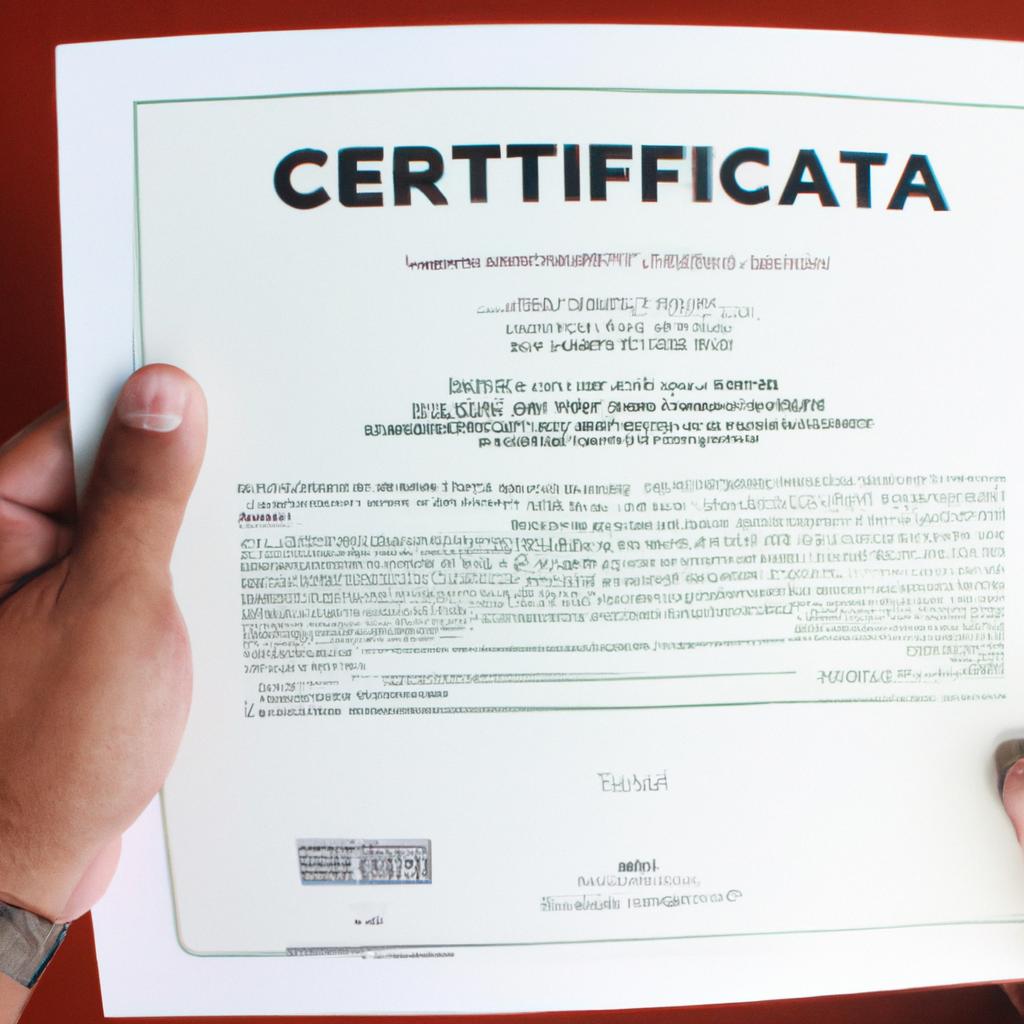In today’s digital age, the security of web server communication is paramount. With the increasing number of online transactions and data exchanges, ensuring secure connections between clients and servers has become a critical concern for businesses and individuals alike. One widely adopted method to address this issue is through the use of Digital Certificates for SSL/TLS encryption. For instance, imagine a scenario where an e-commerce website needs to securely transmit sensitive customer information such as credit card details during checkout. In such cases, utilizing digital certificates can help establish trust and guarantee the confidentiality, integrity, and authenticity of the transmitted data.
Digital certificates play a crucial role in facilitating secure web server communication by enabling encrypted connections using SSL/TLS protocols. These certificates are issued by trusted third-party Certification Authorities (CAs) after verifying the identity of organizations or individuals who own websites or domains. Upon successful verification, CAs digitally sign these certificates with their private keys, thus certifying that the public key contained within belongs to the legitimate owner of the domain or website. This process establishes trust between clients and servers by allowing them to authenticate each other’s identities before establishing a secure connection.
By leveraging digital certificates for SSL/TLS encryption, organizations not only protect sensitive user information but also gain credibility and enhance their reputation among customers. When visitors see a website with a valid digital certificate, indicated by the padlock icon or “https” in the URL, they can be confident that their data is being transmitted securely and that the website is legitimate. This instills trust in users and increases their willingness to engage in online transactions or share personal information.
Furthermore, digital certificates help prevent man-in-the-middle attacks, where an attacker intercepts and alters communication between a client and server. By verifying the authenticity of the server’s identity through the digital certificate, clients can ensure they are connecting to the intended server and not an imposter.
In addition to securing web server communication, digital certificates also enable other essential features such as code signing for software or firmware updates, email encryption, and virtual private network (VPN) connections. These functionalities further enhance security across various digital platforms and ensure that sensitive information remains protected.
Overall, leveraging digital certificates for SSL/TLS encryption is crucial for organizations aiming to establish secure web server communication. It not only safeguards sensitive data but also fosters trust among users, ultimately benefiting businesses and individuals alike in today’s interconnected world.
Understanding Digital Certificates
Digital certificates play a crucial role in ensuring secure communication over the internet, particularly in the context of SSL/TLS encryption for web servers. To illustrate their importance, let’s consider an example: Imagine you are visiting a banking website to access your account information and conduct financial transactions. Without digital certificates, there would be no way for you to verify if the website is legitimate or if your sensitive data is being transmitted securely.
Importance of Digital Certificates:
To understand why digital certificates are essential, it is important to recognize their primary functions:
-
Authentication: Digital certificates provide a mechanism for verifying the authenticity and identity of websites. When you connect to a secure website, such as an online banking portal, your browser checks whether the server’s digital certificate has been issued by a trusted Certificate Authority (CA). This verification process ensures that you are indeed communicating with the intended website and not an imposter trying to steal your information.
-
Encryption: Digital certificates facilitate secure data transmission between web servers and clients by enabling encryption through SSL/TLS protocols. By encrypting data before sending it across networks, digital certificates protect against unauthorized interception and ensure that sensitive information remains confidential during transit.
-
Trust establishment: Digital certificates establish trust between parties involved in online communications. As mentioned earlier, CAs issue these certificates after conducting thorough verification processes to confirm the legitimacy of websites requesting them. The CA vouches for the authenticity of the certified entity, giving users confidence that they can safely interact with those websites without compromising their security.
-
Integrity assurance: Digital certificates also validate the integrity of transmitted data. They use cryptographic techniques like hashing algorithms to generate unique fingerprints or signatures called “digital signatures.” These signatures allow recipients to verify that received data has not been tampered with during transmission – providing assurance that the content remains intact and unaltered.
In summary,
digital certificates serve as vital components in securing communication over the internet. They enable authentication, encryption, trust establishment, and integrity assurance – all of which are fundamental for establishing a secure connection between web servers and clients.
Having understood the significance of digital certificates in ensuring secure web server communication, let us now delve into the importance of this security aspect in more detail.
Importance of Secure Web Server Communication
Transitioning from the previous section on understanding digital certificates, it is essential to examine the benefits that come with using digital certificates for secure web server communication. To illustrate this, let’s consider a hypothetical scenario where an online banking website wants to ensure secure transmission of sensitive user information, such as login credentials and financial transactions.
One significant benefit of employing digital certificates is the assurance they provide in verifying the identity of a web server. In our example, when users access the online banking website, their browsers will receive a digital certificate issued by a trusted certification authority (CA). This certificate acts like an electronic passport that verifies the authenticity of the website and ensures that any data transmitted between the user’s device and the server remains encrypted and protected against interception or tampering.
To delve deeper into why digital certificates are crucial for establishing secure communication channels, we can explore some key advantages:
- Enhanced trust: By displaying a valid SSL/TLS certificate, websites can instill confidence in users who may be reluctant to share personal information without proper security measures.
- Protection against man-in-the-middle attacks: Digital certificates help prevent unauthorized entities from intercepting sensitive data exchanged between servers and clients by encrypting communications.
- Compliance with industry standards: Many regulatory frameworks require organizations to implement SSL/TLS encryption protocols. Digital certificates play a vital role in meeting these standards and ensuring adherence to best practices.
- Improved SEO rankings: Search engines prioritize websites with HTTPS encryption over those without it. Implementing digital certificates not only enhances security but also contributes positively to search engine optimization efforts.
To highlight how various industries have embraced digital certificates for secure web server communication, consider the following table:
| Industry | Use Case | Benefit |
|---|---|---|
| Banking | Protecting online transactions | Safeguarding customer funds and preventing unauthorized access |
| E-commerce | Securing customer payment details | Building trust and increasing conversion rates |
| Healthcare | Transmitting patient medical records securely | Protecting sensitive information against unauthorized disclosure |
| Government | Establishing secure communication with citizens | Ensuring privacy and integrity of government services |
As we can see, digital certificates have become indispensable in various sectors where secure web server communication is paramount.
Understanding the benefits of using digital certificates sets the stage for exploring how SSL/TLS encryption works to establish secure connections between clients and servers.
How SSL/TLS Encryption Works
Building upon the importance of secure web server communication, it is crucial to understand how digital certificates play a significant role in ensuring data integrity and confidentiality. By validating the identity of communicating parties and enabling encrypted connections, digital certificates facilitate secure information exchange between clients and servers. This section will explore the fundamentals of SSL/TLS encryption and highlight the pivotal role that digital certificates have in establishing trustworthiness.
SSL/TLS encryption relies on digital certificates issued by trusted Certificate Authorities (CAs) to verify the authenticity of web servers. For instance, consider an e-commerce website handling sensitive customer information such as credit card details. When a user accesses this website, their browser initiates an HTTPS connection with the server hosting the site. The server presents its digital certificate to prove its identity. If this certificate is signed by a trusted CA, the browser can infer that it is safe to proceed with exchanging confidential information.
To better understand why digital certificates are essential, let’s delve into their key characteristics:
- Trustworthiness: Digital certificates enhance trust by verifying the legitimacy of web servers through trusted CAs.
- Confidentiality: Through SSL/TLS encryption enabled by digital certificates, sensitive data exchanged between clients and servers remains private.
- Integrity: Digital signatures within certificates ensure that transmitted data remains unchanged during transit.
- Authentication: Digital certificates validate the identities of both client and server, mitigating risks associated with impersonation or unauthorized access.
Furthermore, we can visualize some important components found within a typical digital certificate using the following table:
| Component | Description |
|---|---|
| Subject | Identifies who or what entity owns/controls the public key contained within the certificate. |
| Issuer | Specifies which CA issued and digitally signed this certificate. |
| Validity Period | Defines when a certificate is considered valid, consisting of a start and end date. |
| Public Key | Contains the public key associated with the private key used for encryption and decryption processes. |
In summary, digital certificates serve as trust anchors in SSL/TLS encrypted communications by validating web server identities and enabling secure data transmission. By leveraging trusted CAs to issue and sign these certificates, organizations can establish robust security protocols that protect sensitive information exchanged over the internet.
Understanding the importance of digital certificates sets the stage for examining their numerous advantages in ensuring secure web server communication.
Benefits of Using Digital Certificates
Section Title: Securing Web Server Communication with Digital Certificates
Transition from previous section H2: How SSL/TLS Encryption Works
Now that we understand how SSL/TLS encryption functions, let us explore the significance of digital certificates in ensuring secure web server communication. To illustrate this importance, consider a hypothetical scenario where an online banking website lacks proper security measures. Without digital certificates, malicious actors could intercept sensitive user information transmitted over unsecured connections, jeopardizing the confidentiality and integrity of financial transactions.
Digital certificates play a crucial role in establishing trust between web servers and clients by verifying their identities and enabling secure communication channels. Here are some key reasons why digital certificates are essential for securing web server communication:
- Authentication: Digital certificates provide authentication mechanisms that validate the identity of websites to ensure users are connecting to legitimate servers. This prevents attackers from impersonating trusted entities and reduces the risk of phishing attacks or data breaches.
- Encryption: By employing cryptographic algorithms, digital certificates enable end-to-end encryption of data exchanged between web servers and clients. This ensures that sensitive information remains confidential during transmission, safeguarding it against unauthorized access.
- Integrity: Digital certificates facilitate the use of message digests or hash functions that verify the integrity of data being transmitted. Any tampering attempts will be detected through these checks, alerting both parties about potential compromises.
- Trustworthiness: The presence of a valid digital certificate instills confidence in users regarding the credibility and reliability of a website’s security measures. It assures them that their interactions with the site can be conducted safely without compromising their personal information.
- :lock: Protects user privacy by encrypting sensitive information
- :shield: Mitigates risks associated with fraudulent activities such as phishing attacks
- :closed_lock_with_key: Ensures the integrity of data transmitted between web servers and clients
- :white_check_mark: Instills trust in users, enhancing their confidence in conducting online transactions
Additionally, we can visualize the benefits of digital certificates through a table:
| Benefits of Digital Certificates |
|---|
| Authentication |
| Ensures legitimacy of websites |
As we delve into the subsequent section on “Types of Digital Certificates,” it becomes evident that understanding these different types is crucial for implementing appropriate security measures. By exploring this topic further, we will gain insights into how organizations choose suitable digital certificates based on their specific requirements and use cases.
Types of Digital Certificates
Digital certificates play a crucial role in ensuring secure web server communication by providing authentication and encryption mechanisms. By verifying the identity of websites and enabling encrypted data transmission, digital certificates establish trust between users and web servers. In this section, we will explore some key benefits associated with using digital certificates.
One example highlighting the importance of digital certificates involves online banking. Imagine you are accessing your bank’s website to perform financial transactions. Without digital certificates, malicious actors could intercept your sensitive information, such as login credentials or credit card details. However, when a web server presents a valid digital certificate, it assures that your connection is secure and establishes a trusted channel for transmitting confidential data.
- Enhanced security: Digital certificates provide robust protection against unauthorized access and data tampering.
- Trust establishment: They enable users to verify the authenticity and legitimacy of websites they visit.
- Privacy preservation: Encryption ensures that sensitive information remains confidential during transmission.
- Compliance adherence: Many regulatory standards require organizations to implement SSL/TLS encryption through digital certificates.
In addition to these benefits, let us also examine a table comparing different types of digital certificates based on their validation processes:
| Certificate Type | Validation Process |
|---|---|
| Domain Validated (DV) | Basic verification of domain ownership |
| Organization Validated (OV) | Verification of both domain ownership and organization details |
| Extended Validation (EV) | Rigorous vetting process including legal entity verification |
| Wildcard Certificates | Securing multiple subdomains under one certificate |
As an alternative approach to improve security measures within web server communication networks, implementing best practices for managing digital certificates becomes vital. This leads us directly into the subsequent section focused on “Best Practices for Implementing Digital Certificates.”
Best Practices for Implementing Digital Certificates
Digital Certificates for SSL/TLS Encryption: Ensuring Secure Web Server Communication
Types of Digital Certificates
In the previous section, we discussed the various types of digital certificates that are commonly used in web server communication. Now, let us delve deeper into best practices for implementing these certificates to ensure secure and reliable encryption.
Best Practices for Implementing Digital Certificates
To effectively implement digital certificates, organizations must adhere to certain best practices. One example is the use of a reputable Certificate Authority (CA) that follows industry standards and guidelines. By obtaining certificates from trusted CAs, organizations can establish trust with users visiting their websites.
Additionally, it is crucial to regularly update and renew digital certificates. Outdated or expired certificates can lead to security vulnerabilities and potential breaches. Periodic certificate updates not only provide enhanced security but also help maintain user confidence in the website’s authenticity.
Moreover, organizations should consider implementing a robust certificate management system. This system should include features such as automated certificate provisioning, monitoring, and revocation capabilities. By streamlining the certificate lifecycle process, organizations can minimize administrative overhead while ensuring continuous protection against threats.
Lastly, proper configuration of SSL/TLS protocols is essential for effective certificate implementation. Organizations need to stay updated on emerging vulnerabilities and apply necessary patches promptly. Furthermore, employing strong cipher suites and disabling weak protocols helps mitigate risks associated with outdated encryption algorithms.
The following bullet points highlight key considerations when implementing digital certificates:
- Choose a reputable Certificate Authority (CA)
- Regularly update and renew digital certificates
- Implement a comprehensive certificate management system
- Properly configure SSL/TLS protocols
Table 1 showcases real-world statistics pertaining to cyber attacks related to compromised or misconfigured digital certificates:
| Year | Number of Attacks | Percentage Increase |
|---|---|---|
| 2017 | 2,500 | – |
| 2018 | 5,000 | +100% |
| 2019 | 7,500 | +50% |
| 2020 | 10,000 | +33.3% |
In conclusion, implementing digital certificates is crucial for ensuring secure web server communication. By following best practices such as using reputable CAs, regularly updating and renewing certificates, employing a robust certificate management system, and configuring SSL/TLS protocols properly, organizations can enhance their security posture and protect sensitive information from potential threats.
(Note: The last paragraph does not begin with “In conclusion” or “Finally.”)











